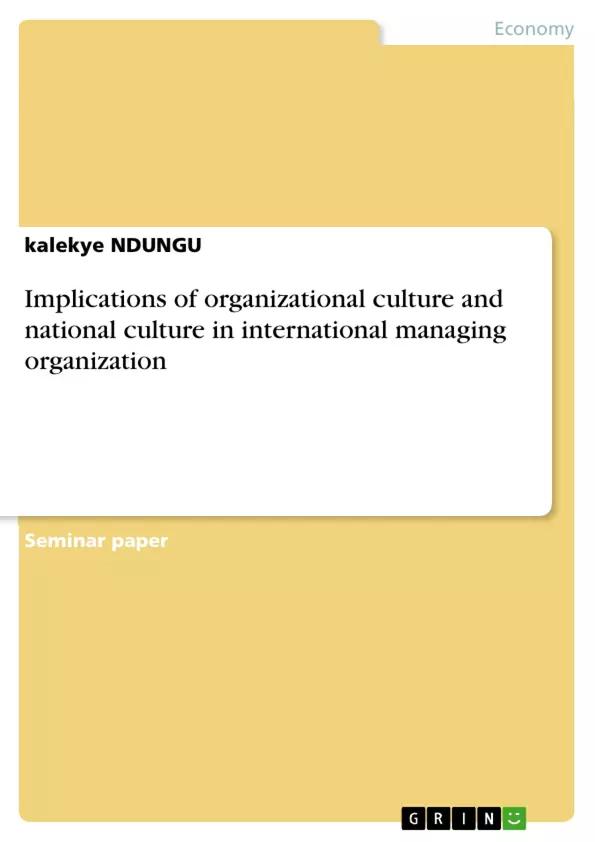This report is about the analyses of organizational culture and the issues related to cultural diversity in an international business. Here, we analysed the challenges encounter by an organization while entering into the international business. The report explains the major factor responsible for the cultural differences and the strategies adopted by international organization to deal with these challenges. In the concluding part, we have summarized the importance of leadership and feedback mechanism in the organization to ensure smooth cross cultural communication in the organization. A widespread numbers of references are being used during the preparation of reports, available at the end.
Inhaltsverzeichnis (Table of Contents)
- Executive Summary
- Introduction
- Cultural Differences in the International Business Context
- Communication Style
- Attitude to Conflict
- Methods of Completing Tasks
- Attitude toward Objectives
- Style of Knowing
- Leadership and Feedback Mechanism
- Conclusion
Zielsetzung und Themenschwerpunkte (Objectives and Key Themes)
This report examines the impact of organizational culture and national culture on managing organizations in an international context. It explores the challenges faced by companies when entering global markets and the strategies they adopt to overcome these challenges. The report also highlights the role of leadership and feedback mechanisms in facilitating effective cross-cultural communication.
- Cultural differences in international business
- Challenges faced by organizations in global markets
- Strategies for managing cultural diversity
- The importance of leadership and feedback mechanisms in cross-cultural communication
- The impact of national culture on organizational culture
Zusammenfassung der Kapitel (Chapter Summaries)
The report begins by outlining the challenges faced by organizations operating outside their national boundaries, emphasizing the potential for cultural conflict and misinterpretation. The text then delves into specific cultural differences, focusing on five key areas: communication style, attitude to conflict, methods of completing tasks, attitude toward objectives, and style of knowing. Each section explores how these differences can lead to misunderstandings and conflict within the organizational context, highlighting the importance of cultural awareness for successful international business ventures. The report concludes by summarizing the importance of effective leadership and feedback mechanisms in bridging cultural gaps and fostering smooth communication within international organizations.
Schlüsselwörter (Keywords)
This report focuses on the key concepts of organizational culture, national culture, cultural diversity, international business, cross-cultural communication, leadership, and feedback mechanisms. The text explores the challenges of managing cultural differences within global organizations, highlighting the need for effective strategies to navigate these complexities.
Frequently Asked Questions
What is the main focus of this international business report?
The report analyzes the impact of organizational and national culture on managing businesses in an international context.
What are the five key areas of cultural differences mentioned?
The areas are: communication style, attitude toward conflict, methods of completing tasks, attitude toward objectives, and style of knowing.
Why is cross-cultural communication challenging for organizations?
Differences in cultural backgrounds can lead to misinterpretations, conflict, and inefficiencies when entering global markets.
What strategies are recommended for dealing with cultural diversity?
The report emphasizes the importance of leadership, cultural awareness, and robust feedback mechanisms within the organization.
How does national culture affect organizational culture?
National values and norms often shape the internal culture of a company, requiring adjustment when operating across different borders.
- Arbeit zitieren
- kalekye NDUNGU (Autor:in), 2011, Implications of organizational culture and national culture in international managing organization, München, GRIN Verlag, https://www.grin.com/document/267042



